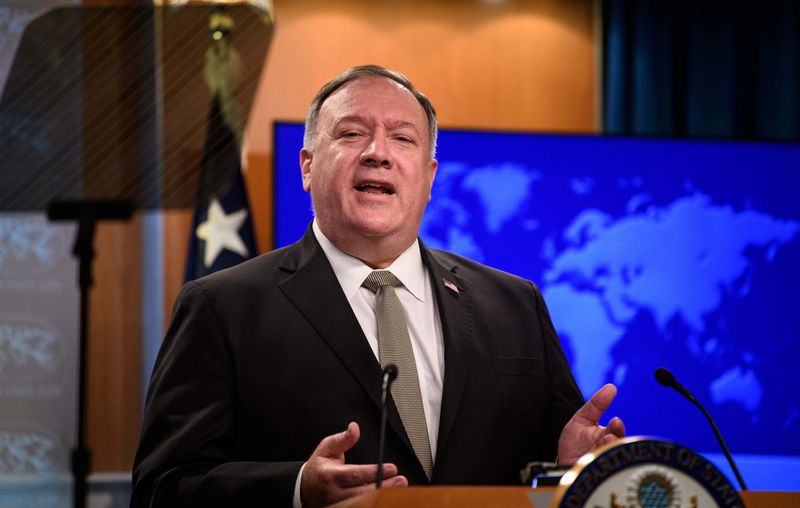HANOI (Reuters) – The United States’ top diplomat on Thursday urged Southeast Asian countries to stand up to maritime bullying by China and to reassess business deals with its state firms, adding to heated exchanges between two powers jostling for influence.
Speaking remotely to foreign ministers of the 10-member Association of South East Asian Nations (ASEAN), Secretary of State Mike Pompeo said the region should be confident in the United States and know it can bank on its support.
“Today, I say keep going. Don’t just speak up but act,” Pompeo said. “Reconsider business dealings with the very state-owned enterprises that bully ASEAN coastal states in the South China Sea. Don’t let the Chinese Communist Party walk over us and our people.”
ASEAN has said it does not want to take sides amid friction over a recent spike in military activities by both powers in the South China Sea and ahead of a November election in which U.S. President Donald Trump will trumpet his tough stand against China.
Asked about China-U.S. tensions on Tuesday in an interview with Reuters, Indonesian Foreign Minister Retno Marsudi said: “We don’t want to get trapped by this rivalry.”
China’s State Councillor Wang Yi on Wednesday told the ASEAN ministers that the United States was interfering in the South China Sea and was driving its militarization.
China says it has historical sovereignty over most of the waterway, but its neighbors and the United States say that claim has no basis in international law, including the 1982 United Nations Convention on the Law of the Sea (UNCLOS), to which China is a signatory.
In a joint statement released late on Thursday, ASEAN member states said progress had been made in negotiations to draft a code of conduct in the South China Sea that was consistent with international law, including UNCLOS.
“Concerns were expressed by some Ministers on the land reclamations, activities, and serious incidents in the area, which have eroded trust and confidence, increased tensions, and may undermine peace, security, and stability in the region,” the statement said.
Pompeo’s swipe at Chinese firms follows Washington’s recent announcement of sanctions on 24 Chinese entities involved in building artificial islands in disputed waters and installing missile systems on them.
U.S. ally the Philippines is among countries where blacklisted firms have secured lucrative contracts. Its president says those will go ahead.
ASEAN ministers also held remote meetings on Thursday with Japan and Australia.
Foreign Minister Marise Payne said Australia was committed to a peaceful Indo-Pacific “free from coercion and with sovereignty, international law and the rights of all states respected and upheld.”
Vietnam Foreign Minister Pham Binh Minh in a statement welcomed the U.S. role in supporting ASEAN’s hope for peace, stability, security and freedom of navigation.
(Additional reporting by Khanh Vu and James Pearson; Writing by Martin Petty; Editing by Hugh Lawson and Peter Graff)






















